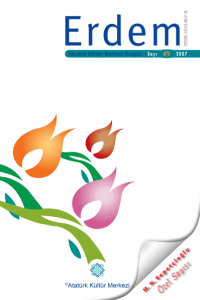Türklerde Devlet Bilinci ve Birlik Düşüncesinin Uyandırılması Açısından Mustafa Necati Sepetçioğlu’nun Kilit ve Çatı Romanlarını Yeniden Okumak
Öz
Bu çalışmada, Türk tarihinin önemli aşamalarını işlediği tarihî romanları ile okura tarih sevgisi aşılayan, “devletleri var eden başlıca unsurun milletler olduğu, bir devletin ne kadar güç koşullar altında olursa
olsun dinamizmini milletin “birlik” düşüncesinden alacağı, bu sebeple
nesillerin, atalarının sahip olduğu ‘devlet bilinci’ ve ‘birlik’ düşüncesini unutmaması gerektiği” düşüncelerini gelecek nesillere anlatabilmek
amacına ömrünü vakfetmiş Mustafa Necati Sepetçioğlu’nun Kilit ve Çatı
romanları üzerinde durulacaktır. Böylece, Selçuklu ve kuruluş dönemindeki Osmanlı toplumunun sahip olduğu devlet bilinci, Türk kültürel hayatının kaynakları, Türk boylarındaki birlik düşüncesi Sepetçioğlu’nun
bakış açısından değerlendirilecektir.
Anahtar Kelimeler
Kaynakça
- (Demir), Kemal Tahir (1989), Notlar/Sanat Edebiyat, C.1, İstanbul: Bağlam Yay.
- Emil, Birol (1972), “Kilit”, Türk Edebiyatı, S. 3, Mart 1972, s. 10-14.
- Eagleton, Terry (1990), Edebiyat Kuramı, (çev. Esen Tarım), İstanbul: Ayrıntı Yay.
- Frye, Northrop (1973), “Archetetypal Criticism: Theory of Miyths”, Anatomy of Criticism, Princeton: (3. b.) Princeton: University Pres. s. 131-239.
- Güngör, Erol (1974), “Anadolu’da Türk Birliği ve Tarikatlar”, Türk Edebiyatı, S. 26, s. 30- 32 ve S.27, s. 26-29.
- İleri, Selim (1973), “Kemal Tahir’le Konuşma”, Yeni Dergi, S. 105, .s. 19-25.
- Kutlu, Mustafa (1977), “Mustafa Necati Sepetçioğlu ve Sevinç Çokum ile Mülâkat”, Türk Edebiyatı, S. 46, s. 24-27.
- Lukács, György (1971), “Romanda Koşullanma ve Tarihsel-Düşünsel Anlam”, Türk Dili Eleştiri Özel Sayısı, S. 234, s. 555-561.
- Sepetçioğlu, Mustafa Necati (1988), Kilit, 15. b. İstanbul: İrfan Yay.
- Sepetçioğlu (2004), Çatı, 25. b., İstanbul: İrfan Yay.
- Wellek R. –Warren, A. (1993), Edebiyat Teorisi, (çev. Ömer Faruk Huyugüzel), İzmir: Akademi Yay.
- Yardım, M. N. (2000), Romancılar Konuşuyor, İstanbul: Kaknüs Yay.
Re-reading of M.N. Sepetçioğlu’s Novels, Kilit and Çatı, in terms of Awakening in the Turks of the Ideas of State and National Unity
Öz
This study will deal with the novels Kilit and Çatı by Mustafa Necati Sepetcioğlu who, writing the important milestones of Turkish history in
his historical novels, makes the love of history accesible to the reader
as an author who dedicated his life to tell his thoughts that the main
factor in the emergence of the state is the nation; no matter how hard
the circumstances are, the state keeps its dynamism by the idea of the
unity of nation; and the nation should not forget the ideas of state and
the unity of nation that they inherited from their ancestors. Thus this study is going to analyse the idea of the state of the empire of the Seljuks and of the period of the establishment of the Ottoman empire, the
notion of unity of the Turkish tribes and the sources of Turkish culture
out of the view of Sepetcioglu.
Anahtar Kelimeler
Sepetcioğlu historical novels acknowledgement of the state notion of unity
Kaynakça
- (Demir), Kemal Tahir (1989), Notlar/Sanat Edebiyat, C.1, İstanbul: Bağlam Yay.
- Emil, Birol (1972), “Kilit”, Türk Edebiyatı, S. 3, Mart 1972, s. 10-14.
- Eagleton, Terry (1990), Edebiyat Kuramı, (çev. Esen Tarım), İstanbul: Ayrıntı Yay.
- Frye, Northrop (1973), “Archetetypal Criticism: Theory of Miyths”, Anatomy of Criticism, Princeton: (3. b.) Princeton: University Pres. s. 131-239.
- Güngör, Erol (1974), “Anadolu’da Türk Birliği ve Tarikatlar”, Türk Edebiyatı, S. 26, s. 30- 32 ve S.27, s. 26-29.
- İleri, Selim (1973), “Kemal Tahir’le Konuşma”, Yeni Dergi, S. 105, .s. 19-25.
- Kutlu, Mustafa (1977), “Mustafa Necati Sepetçioğlu ve Sevinç Çokum ile Mülâkat”, Türk Edebiyatı, S. 46, s. 24-27.
- Lukács, György (1971), “Romanda Koşullanma ve Tarihsel-Düşünsel Anlam”, Türk Dili Eleştiri Özel Sayısı, S. 234, s. 555-561.
- Sepetçioğlu, Mustafa Necati (1988), Kilit, 15. b. İstanbul: İrfan Yay.
- Sepetçioğlu (2004), Çatı, 25. b., İstanbul: İrfan Yay.
- Wellek R. –Warren, A. (1993), Edebiyat Teorisi, (çev. Ömer Faruk Huyugüzel), İzmir: Akademi Yay.
- Yardım, M. N. (2000), Romancılar Konuşuyor, İstanbul: Kaknüs Yay.
Ayrıntılar
| Birincil Dil | Türkçe |
|---|---|
| Bölüm | Erdem |
| Yazarlar | |
| Yayımlanma Tarihi | 2 Aralık 2007 |
| Yayımlandığı Sayı | Yıl 2007 Cilt: 17 Sayı: 49 |
ERDEM Dergisi TR Dizin, MLA International Bibliography, EBSCOhost, SOBIAD, ASI (Advanced Science Index) İSAM, DAVET, AYK Dergi Dizini ve Academindex tarafından dizinlenmektedir.
ERDEM Journal is indexed by TR Dizin, MLA International Bibliography, EBSCOhost, SOBIAD, ASI (Advanced Science Index) ISAM, DAVET, AYK Journal Index and Academindex.


